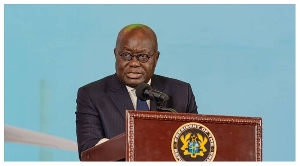Opinions of Sunday, 6 April 2008
Columnist: GNA
The role of the media in free and fair elections
A GNA feature by Mildred Assifuah
Accra, April 4, GNA - The political tension is rising, the masses are expressing all kinds of views, some wholesome, others not, but all in the name of democracy and freedom of speech.
But should the freedom of speech be abused or should people be gagged anytime they try to use aggressive language to disrupt the peace and tranquility of a particular community.
The political atmosphere leading to Elections 2008 could be described as interesting, if not full of uncertainties. The incumbent Presidency, come early January 2009 would have to relinquish political power to either the same party or an opposition party and this is for the electorate to decide on December 7, 2008 and this brings to the fore the role of the media in the whole scenario. The media, often times have been saddled with the responsibility of setting the national agenda in a positive and development oriented manner, especially in this electioneering moment where all eyes are feeding on them for relevant information.
The role of the journalists in this sense, can not be over-emphasized and it a daunting task that must be performed excellently to achieve and enhance ultimate peace, stability and tranquility of the nation.
The pen has always been described as mightier than the sword and this moment is really the time for the media to prove this right. We need not look far to see the mishaps that had been caused due to a party's actions or inactions.
Perhaps the most important function the media should serve in this era of the country's democratic advancement is to provide voters with the information they need to make sound decisions in the voting booth. If people don't know what they're voting for, our democracy is in serious trouble.
Voter ignorance must be extensively dealt with by educating supporters of political parties to choose, not because of personality, tribe or creed but what the individual could offer the nation. The situation where supporters are grossly misinformed about what candidate stands should not happen.
Issues concerning the candidature of a particular person must be presented bare and left to the electorate to take his or her own decision.
How can the electorate know our candidates well and what they stand for if the media concern itself with polls, controversy and spins instead of the concentrating on issues? How do we have meaningful elections when people don't know whom and what they are voting for? The media are responsible for giving us a balanced scrutiny of all claims, careful fact checking, and reasoned analysis that would help the masses to make informed decisions on the choice of a candidate. This notwithstanding, there is the need for effective collaboration between the media and all state agencies concern in ensuring free and fair elections.
The Electoral Commission, the National Media Commission, the National Commission for Civic Education all need to revamp their educational campaign on the dos and don'ts before, during and after elections.
The NCCE in particular needs to overhaul its educational methodologies, especially on democratic governance and the role of the electorate to actively get them involved.
Circumspection should be the watchword in this tense season of vigorous campaign by the various political parties to avoid any conflict situation which might have the tendency to plunge the country into chaos.
Now is the time for the media to stay focused on the decisive election before us and actually sensitise all stakeholders-- the masses, political parties and above all, the Electoral Commission to help move the nation forward.












